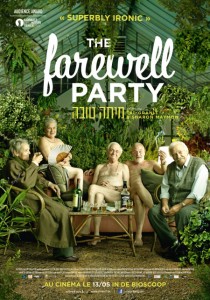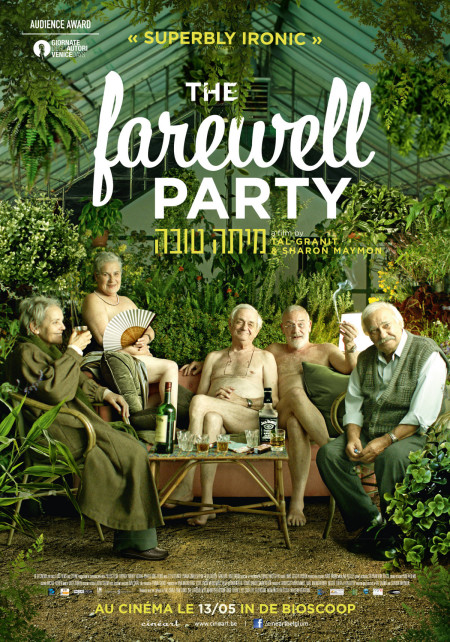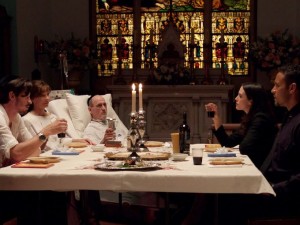Director Carolyn Jones told me that she learned more from Sister Stephen than anyone she has ever met. Sister Stephen is an end-of-life nurse featured in Jones’ documentary, The American Nurse. I also learned a great deal from her, even in a very brief interview.
What do you think that Carolyn Jones learned from you?
Well I think one of the things we talked about and she seem to really have some questions about is this whole thing about dying and how is it for these people at the end of their lives. What do you think is out there for them after they pass away? What are some of your beliefs about that? We talked about that and I think she saw also just being here how our residents really die with dignity and with the peace and the joy and the love surrounding them. That really that’s the way it should be if they all they pass on and I think that that was impressive. It wasn’t a negative experience for her at all.
She said you really bring the entire life cycle into the facility. Tell me why that’s important.
We’re so very fortunate that we are able to do that. We have animals here, we have children here. So there’s not the concept of when you go to the nursing home you’re just gonna sit and rot and die, nobody is gonna care about you and there is no life. I do believe that there is a lot of life here and that we do the best we can to make their last days feel full of life. Having animals and the children around, there is always something going on. We have grandchildren here all the time. Many of our residents are from rural areas and so they get to participate in feeding baby goats or going on hay rides. We do a lot of outings with them. There are children who come here from respite care to interact with them. They bring the residents outside, they bring the animals in to them, they play games with them. So it’s really not just sitting some place and meditating, they’re really involved and I think they feel that. We used to do a lot more activities in the evening, but by evening they want to just rest because their days are full, and they really want to participate in all of that.
What have you learnt from working with people at the end of their lives about the fears and regrets that they are experiencing.
One of my favorite parts of my nursing career is to be with residents at the end of life. One of them was quite a bit younger, he was a hospice resident and he had a battle with alcoholism and never believed in God. At the very end of his life, he did not want us to pray with him. He did say, “I deserve what I’m going to get.” It was kind of sad but we still tried telling him no matter what God loves you and He’s the Father, he’s the Good Shepherd, He’ll call you by name. I think we helped him the best we could and at least he was surrounded by love, he was surrounded by the spirit of God. I really believe that and the rest is up to God and him at that time. Most of our other residents are very ready to die, they’ve lived a full life and most of them are faith-built people and when they get to that age it is like, “I’m ready, let the Lord come and take me, the Lord can come and take me anytime, I’m ready.” It’s not the same when you’re taking care of someone that’s young and have a family. A very few of our people expressed regrets to me, very few. The big thing is the population we work with here is in a rural community I’m sure is different than somebody in a big city that has loss of contact with their children and they do feel alone and maybe part of the loss of contact with their family is something that they contributed to and they may have regrets but most of our people their families are close, they’re here with them when they are dying and in my experience you do not see a lot of that.
Even though the person who is dying may be ready, sometimes the family is not ready.
Exactly, exactly. I’ve gone through it twice with my own parents. They both died here. Both of them had dementia. My father was 71, my mother was 80, so he was a little bit younger. One of the things that was so helpful for me when my mother and dad were dying, and me being a nurse in geriatrics and long term care and seeing all of the many residents that have passed and work with families, I had kind of a difficult time at that point, being sure I was making the right decisions. My nurses were there to support me and help me. So that is what I try to be for the families. We sit down with them and it’s not always just me it’s often our social worker and our team that help them work that through. “What would your mom or dad really want?” Well they don’t want to be on life support. And are the decisions we are making what your parent or loved one would like or is it what you want to do because of your own guilt or comfort or whatever it might be? And it’s ok to let them go, that’s what they wanted. It’s ok not to send them to the hospital and pump IV’s and antibiotics if they are really ready and it’s nothing we can help…they’re not going to get better, they’re just going to be in discomfort.
What changes in the way we do health care in this country would be most beneficial to your work?
This sounds really, really kind of materialistic but I think with the elderly, I think reimbursement is a big issue. There’s still many more things that we would like to be able to do for our residents and have more time for them especially at that time with the families and reimbursement is a big issue. It’s a big issue on who we can actually take care of which is unfortunate. When we were a bigger congregation and we had most of our sisters we never looked at what the financial situation was unfortunately now we have to and that’s very bothersome to most of us.
Medicaid reimbursement is horrible and there’s some people you’d really like to help out but you can only do so much of that or you’re gonna sink. That’s one thing, the other thing I really think are some of the regular regulatory situation. And that’s getting better, I have to say it’ getting better but before when residents were at the end of life and I have to call the doctor regardless of what is happening or what the wishes are, you’ve got to call the doctor and many times if you get an on call physician and it’s like, “I’m not going to do anything unless you send them to the hospital.” They need to be evaluated and, they’re afraid of a lawsuit. Do we really have to be putting them through CAT scans and MRIs to save our butts? It’s not really for the betterment of the residents. It’s probably to save our butts or because of the regulatory issues.
Do you have a favorite bible verse that you like to share with people as they approach the end of their life?
One of them is The Good Shepherd. “I am the good shepherd and I know my sheep and I call each of them by name.” And I really feel, and I said to a women that was dying last night when I prayed with her and I said, it happened to be Good Shepherd Sunday in our church and I said, “Jesus said I’m the good shepherd, I know my sheep, my sheep know me and He will call you by name.” He will call you by name. And I guess that’s one of my very, very favorites.
What was it like to see the film about your work?
When you see the movie on big screen, I was telling my administrator about it this morning, she had tears in her eyes and I had tears in my eyes. It is phenomenal; it just really restores your hope. Sometimes you get in a little bit discouraged because there’s a staffing issue, there’s a financial issue, there’s a regulatory issue and sometimes you wonder what happened to what we really got into nursing for? And you see this and it just like restores your hope. Oh yeah, but there’s a lot we can do, there is many ways we can still serve.





